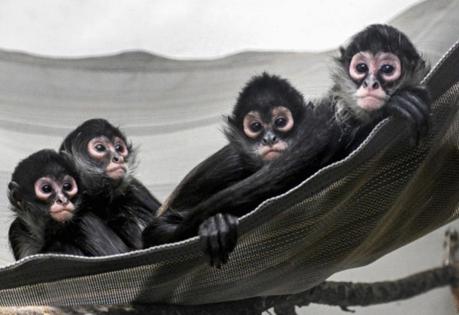Fragile baby spider monkeys 'ripped' from mothers, brought to SoCal. Trafficker sentenced
Published in Science & Technology News
A Texas man was busted for trafficking vulnerable Mexican baby spider monkeys, who were too young to be separated from their mothers, into San Diego and selling them on Facebook.
Sarmad Ghaled Dafar, 33, was recently sentenced to four months in custody and 180 days of home confinement for trafficking six of the young primates, according to the U.S. Department of Justice.
U.S. Fish and Wildlife Service agents uncovered his crimes in 2023 when they intercepted three baby Mexican spider monkeys that had been smuggled across the border in Calexico by someone working for him, prosecutors said.
Not only is it illegal to own primates as pets in California, but it's also especially frowned upon to possess baby spider monkeys. The species is endangered, and infants require constant, skilled care to survive.
"This crime ripped weeks-old baby monkeys from their mothers, disrupted fragile ecosystems, endangered a vulnerable species, and posed significant public health risks," said U.S. Atty. Adam Gordon in a statement Friday.
After officials seized the three monkeys in August 2023, they searched the smuggler's phone and found messages indicating that he was bringing the animals across the border for Dafar.
In his plea agreement, Dafar admitted to coordinating the trafficking of baby spider monkeys, receiving them in the U.S. and arranging their sale.
The three confiscated monkeys — named Chrissy, Jack and Janet — were temporarily quarantined at the San Diego Zoo. As part of his sentence, Dafar was ordered to pay more than $23,500 in restitution for the cost of their quarantine.
The monkeys have since been permanently housed at the Brookfield Zoo in Chicago, alongside two other baby spider monkeys, named Frankee and Bucees, who were seized in a separate Southwest border smuggling case, prosecutors aid.
During the investigation, officials discovered Dafar had previously smuggled and sold at least three other baby Mexican spider monkeys, in June 2022 and July 2023.
Their whereabouts are unknown.
These three additional monkeys were not quarantined, which is required by law to prevent deadly diseases — such as Ebola, Marburg and mpox — from spreading from primates to humans, prosecutors said.
"This is not merely an economic crime; it is a severe and lasting injury to both wildlife and public safety," said Gordon. "Border security is not just about interdicting drugs and preventing illegal entries. It also involves protecting the public from dangerous diseases."
The investigation indicated that Dafar intentionally trafficked baby spider monkeys, despite the risk of separating them from their mothers, because he believed they were easier to hide.
When a Facebook user sent Dafar a news article about spider monkeys seized by U.S. Border Patrol agents, he responded, "He stupid brin[g] to[o] many of them and all adults they make a lot noise and they active. Baby's most be sleeping and small to hide," according to court documents.
Dafar messaged potential customers on Facebook and sent photos of baby spider monkeys in diapers and under a heat lamp, both signs indicating that the primates are too young to survive on their own, prosecutors said.
Spider monkey typically nurse for their first two years of life, and most will stay close to their mothers until they are 4 years old.
Their mothers are protective, and the entire troop will work together to defend the baby in the face of a threat, according to testimony from U.S. Fish and Wildlife agents. As a result, poachers will often kill the mother and troop when trying to capture babies.
Genetic testing of Chrissy, Jack and Janet indicated that they all had separate mothers, meaning it is possible that poachers killed many monkeys to capture them.
Dafar has been ordered to surrender on or before May 29, prosecutors said.
©2025 Los Angeles Times. Visit at latimes.com. Distributed by Tribune Content Agency, LLC.







Comments